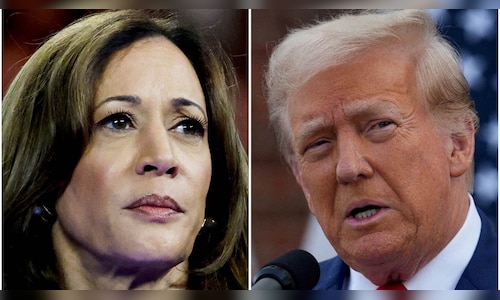[ad_1]
CNBC-TV18 spoke with Aaron Kall, Director of Debate at the University of Michigan, and Mukesh Aghi, President of the US-India Strategic Partnership Forum (USISPF), to better understand the dynamics at play.
Verbatim Excerpts:
Q: What do you feel about Donald Trump right now? Why do you think he has been able to continue holding on to the numbers he has?
Aghi: The race is too close to call. While the poll shows that Kamala Harris leads by 4% points on a national level. But you have to understand this is an electoral vote, and in the seven swing states, the call is just too close for either one of them.
Why is Donald Trump leading? You have to understand, basically, people know Donald Trump as a person and his policies. They know Kamala Harris as a person but don’t know her policy itself. What is happening is while they like Donald Trump’s policies, they don’t like Donald Trump as an individual, as a personality. Whereas in the case of Kamala Harris, they like her as a person, but don’t understand her policies. And the more important thing is, if you look at the polls on immigration and economic issues, it is favoured towards Donald Trump. And those are two big issues. And the third big issue, which I think is going to come in as an October Surprise, is the international turmoil. What’s happening in Ukraine, what’s happening in the Middle East — if that turmoil gets much deeper, broader, then I think you will see a swing towards Donald Trump because voters prefer a male President to deal with those issues. So, I think the race is too close to call, and we’ll see what happens in the next three weeks or so.
Q: What do you think will impact things in the next three weeks? It all goes down to the wire in those key seven swing states. What do you think will be a decider now?
Kall: Another presidential debate seems unlikely. That could be one thing. The economy, the stock markets, interest rates, housing and international issues – the Middle East and Ukraine, things like hurricanes and foreign policy, those could make a very small difference in a very close election.
Q: As someone who analyses debates very closely, how have the two candidates appeared in their campaign speeches? Who has emerged stronger according to you? And why do you think Kamala Harris has not been able to capture the imagination? She is popular and has the lead, but why are we not seeing a clear edge?
Kall: We had the debate in June, and Donald Trump very easily dispatched Joe Biden and caused him to leave the race. Kamala Harris did very well in her one presidential debate against Donald Trump. And that was several weeks ago. And since then, her lead has decreased and she’s called for another debate. But Donald Trump has not taken the bait and accepted that. And he’s just kind of maintained a very disciplined message on the campaign trail and advertisements that are very controversial. Harris is the incumbent vice president, and she’s closely tied to Joe Biden for the last three and a half years. And so there’s a big question: who is the change candidate? Obviously, she would be the first female president. Hillary Clinton was close but didn’t close the deal in 2016. So, there are a lot of things kind of going against her — inflation and what’s happened in the last several years. She entered the race very late last few months, and it is kind of an uphill battle. She has pulled even where Joe Biden was points and points behind. And so in the last month or so, she has a very uphill task. But it’s just close, because the country is so polarised and people really like kind of a change candidate in a different party every four years or so.
Q: What is the mood in the US industry right now as we see the election drawing to a close? What kind of impetus do you expect US and India ties, especially the business ties, to get in the coming weeks?
Aghi: The US election do have an impact on the business community, especially on the taxation side. And they are concerned that Kamala Harris may come in and come down very hard on raising the taxes on the corporate side. But I think on the US-India front, you have to understand it is driven by multiple factor. And it is driven by one important factor, that is China. Both Democrats and Republicans agree that China is an adversary, and we need to take that adversary head on. India becomes critical from that perspective, not only just being partner with India for managing China, but also de-risking supply chain from China into India itself.
More important is India as a $4 trillion economy is becoming a $5 trillion economy. That brings more market opportunity for US companies to leverage that. We are seeing a massive movement of global capability centres being set up in India. And today we have roughly around 1,700 and exporting roughly $125 billion worth of IP out of these centers. So there are multiple factors which are driving this relationship, regardless who comes in, either Trump or Kamala Harris, the relationship between India and the US will continue on the upward trajectory.
Watch the accompanying video for the entire discussion.
[ad_2]
Source link










